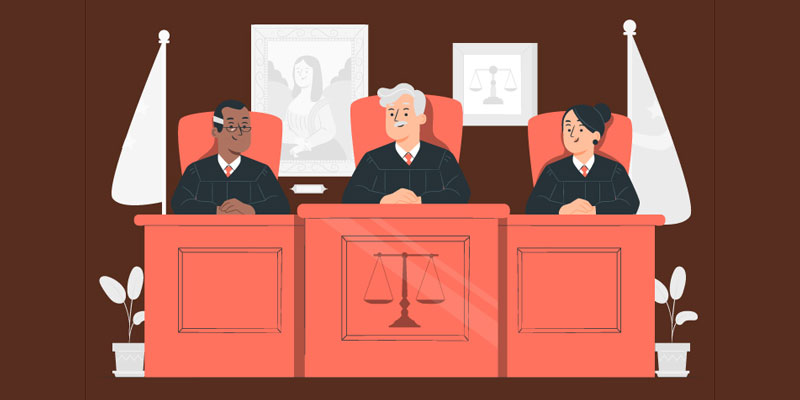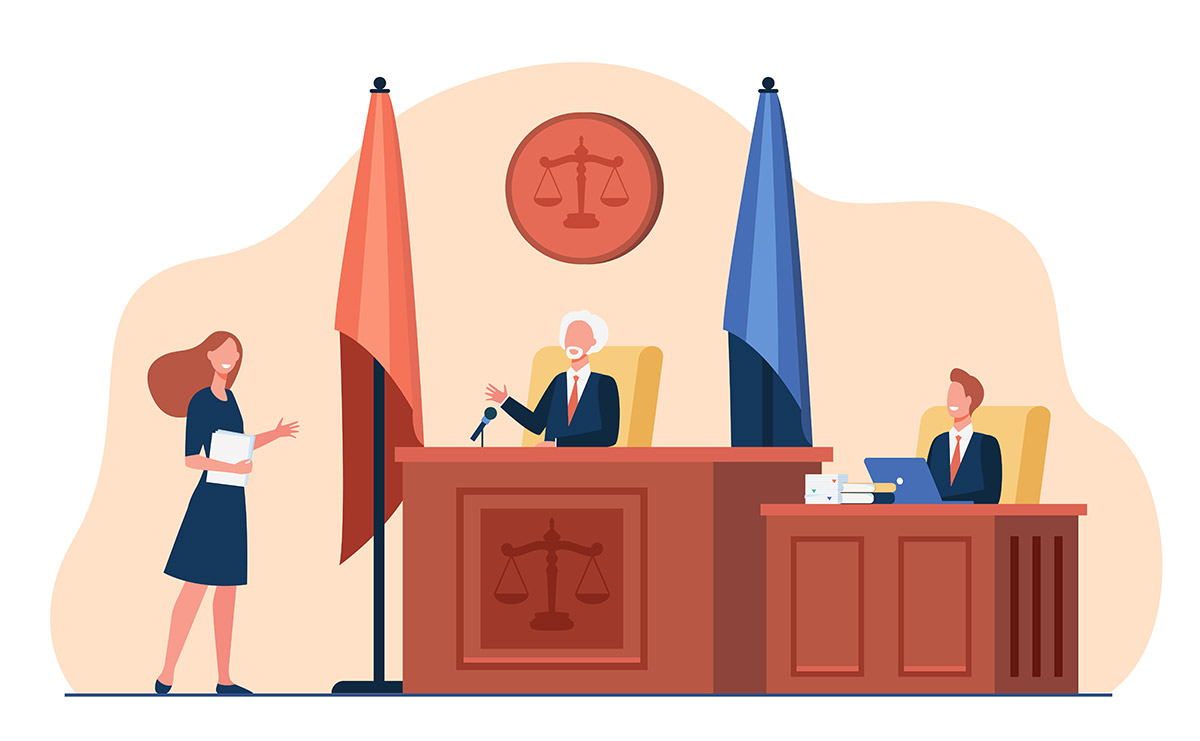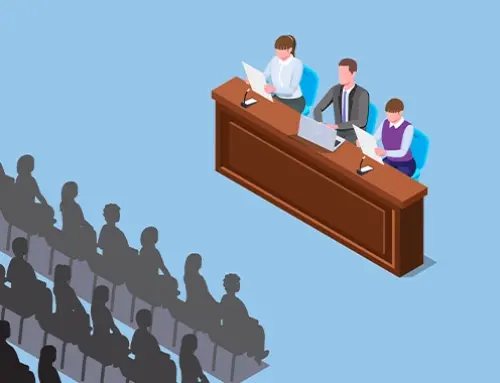Contents
Ensuring Fairness and Justice: The Role of Judicial Codes of Conduct in Legal Practice
A judicial code of conduct is a set of ethical guidelines and professional standards that govern the behavior of judges and judicial officers, ensuring they uphold integrity, impartiality, and fairness in their duties. These codes emphasize the importance of judicial independence, requiring judges to act without external influence, such as political or financial pressures. Impartiality is also central, with judges expected to make decisions based solely on facts and law, free from bias or favoritism. Integrity, both on and off the bench, is crucial in maintaining public confidence in the judicial system. Additionally, judges are held to standards of competence and diligence, ensuring they remain knowledgeable about the law and perform their duties efficiently. By adhering to these principles, the judicial code of conduct plays a crucial role in fostering trust and accountability in the judiciary. Violations of the code of judicial conduct can lead to disciplinary actions, including reprimands, suspension, or even removal from office.
Who Creates and Implements Judicial Codes of Conduct?
Judicial codes of conduct are typically created and implemented by judicial or legal governing bodies at both national and regional levels. In many countries, these bodies may include:
Supreme Courts or Judicial Councils – These bodies often draft, adopt, and oversee the enforcement of judicial codes of conduct. For example, the Judicial Conference is responsible for creating the code for federal judges in the United States.
National Bar Associations or Legal Commissions – Some countries have legal associations or commissions that work alongside the judiciary to develop ethical standards for judges. For example, the Canadian Judicial Council plays a central role in setting ethical standards for judges in Canada.
Legislative Bodies – In some cases, legislatures play a crucial role by enacting laws that include provisions regarding judicial conduct, which serve as a foundation for the code. These laws may set broad ethical requirements or delegate authority to judicial councils to create detailed guidelines, ensuring that the audience is well-informed about the legislative aspect of judicial codes of conduct.
International Organizations – In some contexts, international bodies like the United Nations or the European Court of Human Rights provide global guidance or establish codes for judges operating under international or human rights law frameworks, fostering a sense of global connection and shared responsibility.
Implementing these codes is usually handled through judicial oversight bodies, disciplinary committees, or judicial review boards. These bodies investigate complaints, enforce compliance, and apply sanctions when ethical breaches occur, ensuring that judges adhere to the prescribed standards.
Key Duties in The Canons of Judicial Codes of Conduct
The Canons of Judicial Codes of Conduct play a crucial role in maintaining the integrity, impartiality, and professionalism expected within the judiciary. These codes, while varying by jurisdiction, set out essential duties for judges. Here are some common key duties outlined in most judicial codes:
Impartiality and Fairness: The cornerstone of a judge’s duty, impartiality demands that rulings be based solely on law and facts, devoid of any hint of favoritism or bias. Any action that could suggest preconceived opinions or partiality to any party must be avoided at all costs.
Integrity and Independence: Judges must uphold the independence of the judiciary by avoiding any behavior or external influences that could undermine public confidence in their independence and integrity.
Diligence and Competence: Judges are expected to perform their duties diligently and competently. This includes a continuous commitment to remaining knowledgeable about the law, managing their caseload effectively, and issuing timely rulings and decisions.
Propriety and Avoidance of Appearance of Impropriety: Judges must conduct themselves in a manner that promotes public confidence in the integrity and impartiality of the judiciary. They should avoid both impropriety and the appearance of impropriety in all activities.
Decorum and Respect: Judges should maintain decorum in the courtroom, treat all parties with respect, and ensure that their behavior and communication are courteous and professional.
Avoidance of Conflicts of Interest: Judges are required to disqualify themselves in any case where their impartiality might reasonably be questioned, including situations where they have a personal bias, a financial interest, or a familial relationship with any of the parties involved.
Confidentiality: Judges must maintain the confidentiality of information they receive in their official capacity and refrain from public discussion of cases before them, except as authorized by law.
Compliance with the Law: Judges must not only comply with the law in their professional capacity but also maintain a high standard of personal conduct both on and off the bench. This personal conduct is equally important in maintaining the public’s trust in the judiciary’s integrity and independence.

Avoidance of Political Activity: Many judicial codes restrict judges from engaging in political activities, including endorsing candidates, making public statements about political issues, or holding political office.
These duties are not just a set of rules, but the foundation of the public’s trust in the judiciary’s integrity and independence. They ensure that judges make fair and lawful decisions, thereby upholding the public’s trust in the judicial system.
Mechanisms for Enforcing Codes of Conduct in Legal Systems
Mechanisms for enforcing Judicial Codes of Conduct in legal systems are critical for maintaining the integrity and accountability of the judiciary. These mechanisms ensure that judges who violate ethical standards face appropriate consequences. The primary enforcement mechanisms include:
Judicial Disciplinary Commissions
Most legal systems have independent judicial disciplinary bodies or commissions investigating misconduct complaints. These bodies are typically composed of legal professionals, members of the judiciary, and sometimes laypeople. Laypeople, often chosen for their impartiality and understanding of community standards, play a crucial role in these bodies. They review complaints against judges, investigate misconduct allegations, and determine whether disciplinary action is warranted.
Judicial Review Boards
Some jurisdictions establish judicial review boards, which may function similarly to disciplinary commissions. They assess judicial conduct and can issue recommendations for actions ranging from reprimands to removal. These boards act as oversight bodies, ensuring that judicial behavior adheres to established codes of conduct.
Complaints and Investigations Process
Members of the public, legal professionals, or other judges can file complaints against a judge who is believed to have violated ethical standards. The disciplinary body then conducts a thorough investigation, gathering evidence, interviewing witnesses, and examining the judge’s conduct. In some cases, the investigation may be confidential to protect the integrity of the process and the judge’s reputation unless misconduct is proven.
Sanctions and Disciplinary Actions
If a judge is found to have violated the code of conduct, several disciplinary actions can be taken depending on the severity of the violation. These may include:
- Private or Public Reprimand: A formal warning or censure, which may be private or made public.
- Fines or Penalties: Monetary penalties may be imposed as punishment.
- Suspension: Judges may be temporarily suspended from their duties without pay.
- Removal from Office: In extreme cases, a judge can be removed from office through impeachment processes or by a disciplinary commission’s recommendation.
- Mandatory Counseling or Training: Judges may be required to undergo ethical training or counseling to correct misconduct.
Impeachment or Legislative Removal
In some jurisdictions, the legislature can impeach or remove judges for gross misconduct or violation of ethical standards. Impeachment is a political process that typically involves a trial-like procedure, and removal requires a vote by legislative bodies.
Appellate Court Oversight
Appellate courts often play a significant role in enforcing judicial conduct through their review of lower court decisions. If a judge’s conduct in a case is questioned, appellate courts may examine whether the judge acted ethically or followed proper procedures. Their scrutiny acts as a deterrent to judicial misconduct. In extreme cases, the appellate court may refer the judge for disciplinary action, further reinforcing the importance of their oversight.
Ethical Advisory Opinions
Judicial ethics committees may provide advisory opinions on ethical issues when a judge seeks clarification on certain conduct. While not an enforcement mechanism per se, this process helps prevent misconduct by offering guidance on adhering to the code of conduct.
Judicial Performance Evaluations
Some jurisdictions implement judicial performance evaluation programs, in which judges are periodically assessed based on their conduct, efficiency, and adherence to ethical standards. Evaluations may be conducted by independent bodies, and negative evaluations that reveal patterns of misconduct can lead to disciplinary proceedings.
Media and Public Accountability
While not a formal mechanism, media coverage and public scrutiny can hold judges accountable. Public exposure of unethical conduct may prompt judicial disciplinary bodies to take action, even if a formal complaint has not been filed.
Judicial Recusal and Self-Regulation
Judges are sometimes expected to self-regulate by recusing themselves from cases with conflict of interest or ethical concerns. This informal enforcement mechanism encourages judges to prevent ethical breaches proactively.
By employing these mechanisms, legal systems ensure that judicial misconduct is addressed, promoting accountability and reinforcing public trust in the judiciary’s fairness and integrity.
Ethical Boundaries Outside the Courtroom: The Expectations of Judges in Personal and Public Life
Judges are held to high ethical standards inside and outside the courtroom, as their actions can impact public confidence in the judiciary. Ethical boundaries for judges in their personal and public lives are outlined in the Judicial Codes of Conduct and are meant to ensure that judges maintain impartiality, independence, and integrity at all times. Here are the key expectations of judges beyond their courtroom duties:
Limiting Public Engagements
Judges may engage in public or community activities, but they must do so in a manner that does not compromise their impartiality or appear to exploit their judicial office. While they can participate in charitable work, they should avoid leadership roles in organizations that may come before the court or engage in controversial causes. Similarly, judges may give public talks and lectures or teach law-related courses, but they must avoid offering legal opinions on matters that could later appear before them in court.
Avoiding Public Perception of Bias
Even outside of legal proceedings, judges must avoid actions that could create the appearance of bias. For instance, they must be cautious about forming close relationships with individuals or organizations that might seem to influence their judicial decisions. Additionally, judges should refrain from endorsing products, services, or causes, as this could be perceived as misusing their judicial office for personal gain.
Financial Disclosure and Transparency
Judges are often required to disclose their financial interests and other sources of income to ensure transparency and prevent any potential conflicts of interest. These disclosures are intended to reassure the public that judges are acting impartially and not influenced by personal financial gains.
Limitations on Fundraising and Gifts
Judges are typically prohibited from fundraising, especially for political or controversial causes. They must also avoid accepting gifts, favors, or loans that could raise questions about their impartiality. Judges must not accept gifts from individuals or organizations that are likely to appear in court, and gifts must be carefully considered, even in personal contexts, to avoid the appearance of impropriety.
Public Comments on Legal Matters
Judges are expected to refrain from commenting publicly on cases, laws, or legal controversies, especially on matters that may come before them. This helps preserve public confidence in their ability to remain impartial. Judges must avoid making derogatory public remarks about their colleagues or other courts, ensuring mutual respect and preserving the judicial system’s integrity.
Engagement in Scholarly or Law Reform Activities
While judges may participate in law reform efforts or scholarly activities, they must ensure that their involvement does not give the impression of partiality or political advocacy. Any commentary on legal reform should be neutral and focused on improving the administration of justice.
How Codes of Conduct Preserve Nonpartisanship in Legal Practice
Codes of Conduct play a crucial role in keeping the legal system unbiased by establishing clear ethical standards that judges, and legal professionals must follow. These guidelines ensure that judges remain neutral, staying away from political activities like endorsing candidates, running campaigns, or holding political office. This helps maintain their focus on applying the law fairly, free from any personal or political influence.
In addition, these codes prevent legal professionals from commenting on cases or controversial issues that could appear before the court, reinforcing the perception of impartiality. By setting strict rules on conflicts of interest, public statements, and political involvement, the codes work to uphold the principle of nonpartisanship. This, in turn, preserves public confidence in the justice system’s fairness and integrity.
What is Model Code of Judicial Conduct?
The model code of judicial conduct, a set of ethical guidelines developed by the American Bar Association (ABA), is a cornerstone in establishing standards for the ethical behavior of judges in the United States. Attorneys are expected to follow the ABA litigation codes to ensure ethical and professional conduct throughout the litigation process, from discovery to trial. It is designed to ensure that judges act with integrity, impartiality, and fairness in their judicial duties, both in and outside the courtroom. The code outlines principles related to judicial independence, avoiding conflicts of interest, maintaining impartiality, ensuring diligence, and, importantly, promoting public confidence in the judiciary.
While it serves as a model for state and federal courts, the model code of judicial conduct is not a rigid set of rules. Each jurisdiction has the flexibility to adopt and modify the code to fit its specific legal framework, ensuring that the principles of integrity, impartiality, and fairness are upheld in a manner that best suits their unique circumstances. The primary goal of the model code of judicial conduct remains to uphold the rule of law and foster public trust in the judicial system.
Also, ABA litigation code set help law firms and clients clearly define and track the specific tasks performed throughout the litigation process, such as discovery, pre-trial motions, and trial preparation, improving transparency and consistency in legal billing. Meanwhile, ABA litigation billing codes are standardized task-based codes used by attorneys and law firms to categorize and track billable activities during the litigation process, helping ensure consistency and clarity in legal billing practices. Law firms often use ABA litigation task codes to ensure transparency and accuracy in client billing.
United States Codes of Judicial Conduct
Below, you can find links to each state’s code of judicial conduct:
| STATES |
STATES |
STATES |
|---|---|---|
| Alabama | ||
Final Thoughts on Judicial Codes of Conduct
Judicial codes of conduct are fundamental in maintaining the integrity, impartiality, and professionalism of the legal system. These codes set clear ethical standards that guide judges and legal professionals in their behavior, ensuring they uphold public trust and avoid conflicts of interest or inappropriate conduct. By adhering to these principles, judges maintain independence from political and external pressures, which is essential for delivering fair and just rulings.
The effectiveness of code of judicial conduct relies on consistent enforcement, transparency, and accountability, as breaches can damage public confidence in the judiciary. However, challenges remain in ensuring these standards are uniformly applied and interpreted across jurisdictions. As society evolves, judicial codes continue to adapt, addressing emerging issues such as technology, social media, and political influence. Ultimately, judicial codes of conduct are vital to preserving the fairness and credibility of the legal system, reinforcing the rule of law.
Frequently Asked Questions
What court in the United States is not bound by the code of judicial conduct?
The U.S. Supreme Court is the only court in the United States that is not bound by the Code of Judicial Conduct. While lower federal courts and state courts are required to follow judicial codes of conduct, the Supreme Court justices are not formally bound by these rules. However, they generally adhere to similar ethical principles voluntarily, although there has been ongoing debate about whether they should be officially subject to the same or a similar code of conduct.
What is the Canadian Code of Conduct?
The Canadian Code of Conduct typically refers to a set of rules, guidelines, or principles designed to govern the professional and ethical behavior of individuals in various sectors in Canada. However, the most common association with the term would be the Canadian Bar Association (CBA) Code of Professional Conduct for lawyers, which outlines the standards and ethical obligations that lawyers must adhere to while practicing law in Canada. Each province and territory in Canada has its own law society, which may have additional or modified standards for lawyers in that region. For example, the Law Society of Ontario and the Law Society of British Columbia have their own codes of conduct that are aligned with, but sometimes differ slightly from the CBA’s guidelines.
Disclaimer: The content provided on this blog is for informational purposes only and does not constitute legal, financial, or professional advice.







